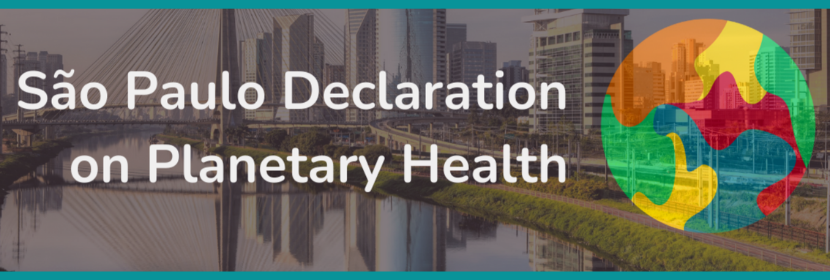WONCA signs the São Paulo Declaration on Planetary Health
 Boston, MA, October 5, 2021
Boston, MA, October 5, 2021 – The
Planetary Health Alliance, a global consortium hosted within the
Harvard T.H. Chan School of Public Health, and the
University of São Paulo have launched the São Paulo Declaration on Planetary Health. Developed by the global planetary health community with support from the
United Nations Development Programme, the Declaration states that humans must make transformational shifts now in how we live in order to optimize the health and well-being of all people and the planet we depend on. It also guides people across society with suggested concrete actions that support a more just and regenerative post-pandemic world.
WONCA and over 250 organizations from 47 countries representing more than 19 sectors across society endorsed the document, including the
World Wildlife Fund-International,
American Public Health Association,
Brazilian Academy of Sciences, and the
World Business Council on Sustainable Development.
The Declaration will be published online in
The Lancet on October 5, 2021. To celebrate, a
launch event will be held on October 6, 2021, at 11:00 AM ET (15:00 UTC), with special guests Achim Steiner (administrator, United Nations Development Programme), Paul Polman (influencer, business leader, campaigner, and author), Hindou Oumarou Ibrahim (president, Association for Indigenous Women and Peoples of Chad), and
Donald Li (president, World Organization of Family Doctors). This event will also feature three case study examples of planetary health actions in practice in Brazil, Costa Rica, and Sudan as well as a featured video of the Declaration’s organization signatories.
“The urgency of this moment is hard to overstate,” said Sam Myers, director of the Planetary Health Alliance, principal research scientist in environmental health at Harvard T.H. Chan School of Public Health, and lead author of The Lancet letter. “Planetary health science convincingly demonstrates that the ongoing degradation of our planet’s natural systems is a clear and present danger to the health of all people everywhere.”
Planetary health is a solutions-oriented, transdisciplinary field and social movement focused on analyzing and addressing the impacts of human disruptions to Earth’s natural systems on human health and all life on Earth. The field was initially launched with the release of the Rockefeller-Lancet Commission report “
Safeguarding Human Health in the Anthropocene.” Subsequently, the Rockefeller Foundation, and then the Wellcome Trust, provided core support for the Planetary Health Alliance (PHA) to foster the field and community.
The São Paulo Declaration is being released in the lead up to the United Nations Convention on Biological Diversity and COP26 climate change negotiations, in addition to the near-term G20 and Stockholm +50 meetings amid the COVID-19 pandemic.
The Declaration encourages everyone to play a role and clearly lays out instructions for how each person and group can contribute to the
Great Transition: a deep, rapid, structural shift in how we live that optimizes the health and well-being of all people and the planet. Among the 19 stakeholder groups featured in the Declaration, a sample of what the planetary health community calls for includes:
● Companies to invest in and implement plans for net-zero, Nature-positive businesses.
● Governments to center planetary health in international, national, and local policies, recovery plans, and budgets, specifically in post COVID-19 plans and economic and environmental policies.
● The health sector to reorient all aspects of health systems toward planetary health – from procurement, energy sources, healthcare efficiency, to waste reduction.
● Media to tell the stories of those who are protecting Nature and fighting for justice and equity, hold those to account who are damaging the planet’s natural systems, and fight infodemics of misinformation.
Antonio Saraiva, professor and researcher at the Institute of Advanced Studies and Polytechnic School at the University of São Paulo, organizer of the 2021 Planetary Health Annual Meeting that generated this Declaration, and co-author of The Lancet letter, said, “This Declaration highlights a core principle of planetary health: Any discussion regarding the current planetary emergencies must revolve around equity, social justice, and human survival.”
“In the midst of COVID, disparities in vaccine accessibility must be part of the same conversation as addressing planetary emergencies,” said Courtney Howard, an emergency physician in Yellowknife, in Canada’s subarctic, and contributor to the Declaration. “On an interconnected planet, no one is safe until everyone is safe. We need vaccine equity, and in the long run, protecting nature will be the true vaccine against future pandemics and other planetary emergencies.”
“Planetary health addresses multiple solutions and deserves to be scaled as the necessary conceptual framework to address planetary emergencies that are often dealt with in silos,” said Nicole De Paula, founder and Executive Director of Women Leaders for Planetary Health and contributor to the Declaration.
Jeremy Pivor
Senior Program Coordinator, Planetary Health Alliance
Lead organizer, São Paulo Declaration on Planetary Health
Download the São Paulo Declaration on Planetary Health
Visit the Planetary Health Alliance website